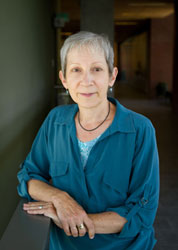Effect of Environmental Exposures on Human Fertility Among Topics to be Discussed at July 11 Friday Evening Lecture

MBL, WOODS HOLE, MA— By comparison with other species, humans are not very adept at making babies; the rate of fetal loss is higher in humans than in any other species studied to date.To add to our reproductive woes, there is ample evidence that the incidence of human infertility has increased during the past several decades.

The factors responsible for these human reproductive problems will be the focus of the next MBL Friday Evening Lecture, Friday, July 11. Dr. Patricia Hunt, a geneticist and professor at Washington State University, will present “Declining Human Fertility: A Conspiracy of Sex, Age, and the Environment?”. The lecture will be held at 8:00 PM in the MBL’s Lillie Auditorium, 7 MBL Street, Woods Hole. The event is free and open to the public.
In addition to discussing the apparently innate propensity for errors in the process of making human eggs, Dr. Hunt will discuss the changing reproductive patterns that are contributing to the human infertility problem, and the growing concern about environmental exposures adversely affecting fertility.
Because assessing the effect of the environment on human reproduction is difficult, scientists are forced to rely on experimental data. What these data tell us and the relevance of the findings to humans has been the subject of intense debate. Nevertheless, the evidence that some chemicals with hormone-like properties (known as endocrine disruptors) that are ubiquitous in our environment significantly compromise reproduction continues to mount. These experimental data and their relevance to humans will be discussed.
Dr. Patricia Hunt is a geneticist and a Meyer Distinguished Professor at Washington State University. Her research focuses on the genetic control of mammalian gametogenesis with an emphasis on meiosis, age-related increases in meiotic errors in females, the impact of environmental contaminants on mammalian reproduction, and assisted reproductive technologies.
Dr. Hunt received her B.A. from Michigan State University and earned her Ph.D. in Reproductive Biology from the University of Hawaii in 1983. She was called “the accidental toxicologist” in 1998 by Scientific American magazine when bisephenol A (BPA) accidently made its way into her research environment. This was before BPA became a household word, and her findings started the whole prohibiting use of BPA movement.
From 2002 to 2004, Dr. Hunt served as a Course Director for the MBL’s Frontiers in Reproduction. In 2007, she was named to Scientific American’s list of the top 50 researchers in the country. Dr. Hunt is currently a member of the American Society of Human Genetics and the Society for the Study of Reproduction, and is also a Board of Reviewing Editors member for Biology of Reproduction.
The Friday Evening Lecture Series will continue throughout the summer at the MBL. The remaining lectures in the series are below. For more information, visit mbl.edu/FEL
July 18:
Forbes Lecture – Joseph Fetcho, Cornell University
“Transparent Vertebrates Offer a Direct View of the Nervous System in Action”
July 25:
Porter Lecture – Richard Hynes, Massachusetts Institute of Technology; Howard Hughes Medical Institute
“The Intelligent Glue that Holds Us Together”
August 1:
Daniel Schrag, Harvard University Center for the Environment
“The Timescales of Climate Change”
August 8:
Mitchell Sogin, Marine Biological Laboratory
“Stepping on the Long Tail of Microbial Populations in Humans and the World’s Oceans”
August 15:
Carla Shatz, Stanford University
“Surprise at the Synapse: Developmental Critical Periods and Disease – Can Knowledge of One Help Cure the Other?”
August 22:
Lederberg Lecture – Susan Lindquist, Whitehead Institute for Biomedical Research; Howard Hughes Medical Institute
“From Yeast Cells to Patient Neurons: A Powerful Discovery Platform for Combating Neurodegenerative Diseases”
—###—
The Marine Biological Laboratory (MBL) is dedicated to scientific discovery and improving the human condition through research and education in biology, biomedicine, and environmental science. Founded in Woods Hole, Massachusetts, in 1888, the MBL is a private, nonprofit institution and an affiliate of the University of Chicago.